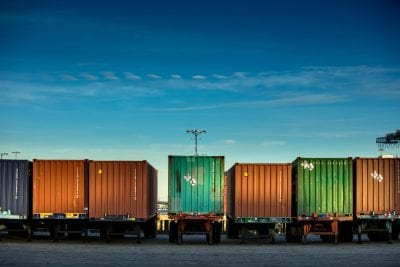The sharp and sustained decline in the price of oil has had far-reaching consequences across the U.S. economy. There are numerous factors that have caused oil prices to drop. And now, with excess oil supply, the effects are all-encompassing, with positive and negative impacts on carriers and shippers.
Low Oil Prices are Good for Some, Bad for Others
Some industries benefit from lower oil prices, and some are hurt. The energy industry is in a deep depression, and the industrial and manufacturing industries are following in its footsteps. Industries closer to the consumer, such as retailers, are taking advantage of lower shipping costs and higher levels of consumer spending. Consumers benefit from low fuel costs, too.
Transportation, as a fuel-intensive industry, has immediate, short-term benefits of lower operating costs, and is generally considered to be aided by low fuel costs. However, this doesn’t tell the whole story, and the transportation industry, like many others, is seeing lower revenues.
The Downsides of Low Fuel Costs
While it’s true that carriers, especially trucking firms, see lower operating costs due to lower fuel costs, it does not translate into higher revenues or profits. Fuel surcharge is typically a source of revenue for carriers, and now they must lower it significantly to stay competitive. Overall line-haul rates are lower too, further shrinking carriers’ margins.
The serious driver shortage in the over-the-road (OTR) industry exacerbates these problems. As drivers leave the industry, carriers must pay more to recruit new ones, and pay their existing drivers a higher salary to retain them. These additional costs eat up profit margins.
Low priced oil affects freight volume, which can hurt trucking companies. For example, flatbed carriers are being hit the hardest by current oil prices. The almost universal shutdown of oil drilling sites in North America, and resulting pain felt by steel manufacturers, mining companies and equipment manufacturers, has led to severely decreased flatbed freight tonnage. Demand for flatbed services is now just above recession levels in 2009.
Flatbed trucking companies may experience the worst side effects of low priced oil, but all of the transportation industry is being hurt one way or another. Despite all of these issues, we may only be beginning to see how badly the transportation industry will be hurt by oil prices.
The Prolonged Consequences of Low Oil Prices
Within the next few years, there will be an oil price spike. History tells us that the longer oil prices stay low, the sharper the price will spike. Members of OPEC are confident this will happen – with U.S. shale producers and others around the world scaling back on production, the glut of oil supply will be rapidly used up, leading to a shortage for demand. Then, it’s predicted that prices will more than double in a short time.

This price spike will cause higher fuel costs, leading to lower consumer spending levels, which means less freight tonnage and revenue for freight carriers.
The spike in oil prices is predicted to happen around 2018. Around this time, carriers will be making operational changes to comply with new regulations, as well as investing in newer, more fuel-efficient equipment to replace their aging fleets. The driver shortage is expected to get even worse by 2018, and carriers will be financially stressed trying to retain their current drivers while spending more than ever on driver recruitment.
Freight tonnage, fuel, and operating costs are shockingly similar to the 2008 market for freight carriers. In the first six months of 2008, 1,908 trucking companies closed their doors. While the future spike in oil prices may not cause quite as many carrier shutdowns, carriers will be under serious pressure to streamline operations and protect already razor-thin margins for the foreseeable future.
Higher fuel costs lead to higher freight rates, but with the challenges trucking companies will face, it’s doubtful they will be able to turn the spike into meaningful profit. With the anticipated sky high freight rates, many small carriers will go out of business, a large portion of freight tonnage will shift to rail and other modes, furthering the damage done to OTR trucking revenue. You can expect everyday products, like a head of lettuce, to rise in price or experience an altered supply chain focused on local sourcing and warehousing, once again eating at trucking companies profits.
Low carrier revenues are bad for shippers too. With the obstacles carriers will face, they will be continually raising rates to break even. This inflates logistics costs for shippers, shrinking their profit margins and likely causing increased product prices. This makes it more difficult to stay competitive in the market place, especially for small carriers, and can have compounding effects throughout a shipper’s organization – altered supply chains, staff reductions and/or lost market share.
What Can Shippers Do?
Shippers will feel the pain when fuel costs rise to similar rates seen in 2014. The best way to avoid paying top dollar for fuel surcharges is to work with a 3PL. 3PLs have large carrier networks which give them leverage to negotiate lower-than-market average fuel surcharges and lower base rates.
For industrial and manufacturing companies, now is a great time to find a transportation partner. When times are tough, 3PLs find creative solutions to save money on transportation. When times are good, as they should be when oil production picks up, and steel and other mining and drilling equipment is in demand, 3PLs provide surge capacity, help manage the complexities of high freight volume, and use powerful technology to optimize freight moves based on speed and safety.
Want to learn more? Keep reading: Do I Need Logistics Help for Mining, Oil & Gas Operations?

